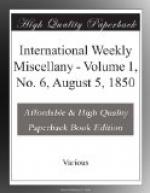* * * * *
BOYER, EX-PRESIDENT OF HAYTI.
Jean Pierre Boyer, a mulatto, distinguished in affairs, and for his abilities and justice, was born at Port-au-Prince, on the 6th of February, 1776. His father, by some said to have been of mixed blood, was a tailor and shopkeeper, of fair reputation and some property, and his mother a negress from Congo in Africa, who had been a slave in the neighborhood. He joined the French Commissioners, Santhonax and Polverel, in whose company, after the arrival of the English, he withdrew to Jacqemel. Here he attached himself to Rigaud, set out with him to France, and was captured on his passage by the Americans, during the war between France and the United States. Being released at the end of the war, he proceeded to Paris, where he remained until the organization of Le Clerc’s expedition against St. Domingo. This expedition he with many other persons of color joined; but on the death of Le Clerc he attached himself to the party of Petion, with whom he acted during the remainder of that chieftain’s life, which terminated on the 29th of March, 1818. Under Petion he rose from the post of aid-de-camp and private secretary to be general of the arrondissement of Port-au-Prince; and Petion named him for the succession in the Presidency, to which he was inducted without opposition. When the revolution broke out in the northern part of the island, in 1820, Boyer was invited by the insurgents to place himself at their head; and on the death of Christophe, the northern and southern parts of the island were united under his administration into one government, under the style of the Republic of Hayti. In the following year the Spanish inhabitants of the eastern part of the island voluntarily placed themselves under the government of Boyer, who thus became, chiefly by the force of character, without much positive effort, the undisputed master of all St. Domingo.
It is not questionable that the productions and general prosperity of the island decreased under Boyer’s administration. The blacks needed the stringent policy of some such tyrant as Christophe. And the popularity of Boyer was greatly lessened by his approval or direct negotiation of a treaty with France, by which he agreed to pay to that country an indemnity of 150,000,000 of francs, in five annual instalments. The French Government recognized the independence of Hayti, but it was impossible for Boyer to meet his engagements. He however conducted the administration




